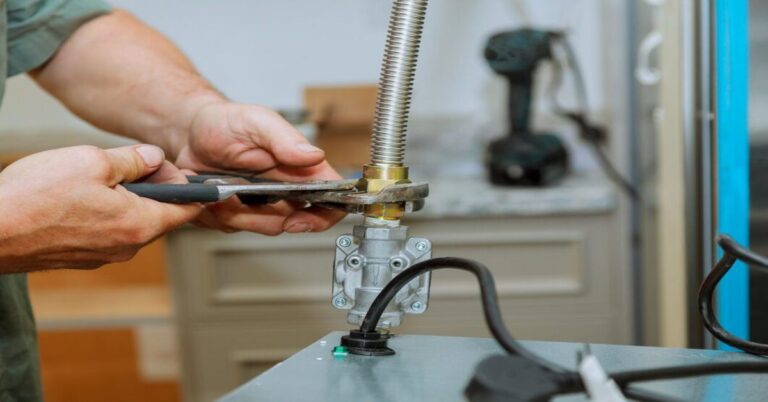Prevent home explosions and gas leaks by maintaining your lines.
Every year fire departments across the country respond to over 3,200 gas-related residential fires.
The majority of these fires are preventable through regular maintenance.
The good news?
It’s never been easier or more affordable to protect your home and family from deadly leaks and explosions.
You’ll learn:
- Why gas line maintenance is so important
- How often to inspect your gas lines
- Warning signs of a potential leak
- Easy do it yourself inspection steps
- The value of hiring a professional
Why Gas Line Maintenance Is So Important
Gas line maintenance is not just another thing to add to your to do list around the house.
It’s a matter of life and death.
Millions of American homes run on natural gas.
It heats our water, cooks our food, and keeps us warm in the winter.
The problem? This gas can be deadly if it leaks out of the lines.
When you need professional assistance with your gas lines problems, working with Boris Mechanical licensed and certified gas line plumbers means your system will be inspected, repaired, and maintained to the highest standards of safety.
They have the tools and the knowledge to identify problems before they turn into disasters.
There are over 2.3 million miles of gas distribution lines running beneath American homes.
Thousands of those miles of pipe are over 50 years old. That’s why regular maintenance is so crucial.
Here’s the worst part:
Most homeowners have no idea where their gas lines run or what condition they’re in.
How Often Should You Inspect Your Gas Lines?
One question most homeowners never ask is this…
How often should you actually inspect your gas lines?
Annual professional inspections are recommended.
This ensures your gas lines are in excellent condition and up to code.
In addition to your professional inspection, you should visually inspect your lines at least twice per year. Twice a year in the middle of summer and winter because:
- Summer causes gas lines to expand, which can create cracks and leaks.
- Winter temperatures lead to rust and corrosion.
- Temperature fluctuations put stress on your pipes.
If you live in an older home or you have recently had work performed on your gas lines, it’s wise to inspect your lines more frequently.
Warning Signs That Require Immediate Attention
Knowing the warning signs that your gas line system is leaking is important.
Here are some of the warning signs to keep an eye and nose out for:
Smell & Sound Alerts: Rotten egg odor, hissing or whistling near gas connections, or blowing sounds coming from the pipes. If you experience any of these, it’s time to evacuate your home and call 911.
Visual Clues: Dying vegetation in a circular pattern near gas lines, blowing dirt at a gas connection, bubbles in standing water heater where a gas line runs, visible damage or corrosion on an exposed gas line.
Performance Issues: Gas appliances that don’t function as they should, pilot lights that won’t stay lit, yellow or orange flames instead of blue, and inexplicable surges on your gas bill.
DIY Gas Line Inspection Steps
Before we get into the DIY steps for inspecting your gas line, make sure all of your gas appliances are turned off.
Here’s the steps you should take.
Step 1: Visual Inspection
Take a look at all exposed gas lines around your property. Visually check for any of the following:
- Signs of rust or corrosion.
- Cracks, dents, or holes.
- Loose connections or fittings.
- Damaged pipe insulation.
Step 2: The Soap Test
This time-tested method can help detect even small leaks.
Mix equal parts dish soap and water in a spray bottle.
Spray the solution on all of your gas line connections and fittings.
Turn your gas back on and closely watch for bubbles. If you see bubbles forming, you have a leak and you should call a professional.
Step 3: Meter Check
Visually inspect your gas meter and all lines that connect to it.
Check for any signs of damage, wear, or debris. If you smell gas around the meter, call for professional help immediately.
The Importance of Professional Inspections
Let’s talk about why gas line maintenance is so important…
While these DIY inspections are great, they can never take the place of a professional inspection.
Licensed and certified gas line plumbers have specialized equipment that can detect gas leaks you will never be able to find on your own.
Professional inspections involve:
- The use of electronic leak detectors to find leaks.
- Pressure tests to check the integrity of the system.
- Close inspection of all connections, valves, and fittings.
- Inspection of gas-fired appliances to verify they’re up to code.
- Checking for proper clearances around appliances.
Recent studies have shown that homes with regular inspections from a professional plumber experience 30% lower costs for emergency repairs than those who do not have a routine maintenance plan in place.
Impressive, right?
Common Gas Line Problems
It’s also important to have an understanding of some of the common problems that can arise with your gas line system.
Corrosion & Aging: Corrosion is a gradual problem as metal ages. Corrosion becomes worse when pipes are exposed to extreme weather conditions. A professional inspection will identify aging pipes early before they fail.
Loose Connections: Vibrations from gas appliances and temperature changes can cause connections to loosen over time. Regular tightening of connections prevents leaks from developing.
Third-Party Damage: Did you know that excavations account for 24% of all pipeline explosions? Before you dig on your property, always call 811 to have underground utility lines marked.
Improper Installation: Poor workmanship is a leading cause of gas line problems. Only hire licensed and certified plumbers for gas line work.
Seasonal Maintenance Tips
Gas lines require maintenance year round.
Here are some seasonal maintenance tips to keep your lines in top condition:
Summer Maintenance:
- Check for cracks caused by heat expansion.
- Ensure outdoor appliances have adequate ventilation.
- Look for pest damage.
- Schedule your annual professional inspection.
Winter Maintenance:
- Monitor for ice build up around meters and regulators.
- Check for rust or corrosion from moisture.
- Make sure vents are not blocked by snow or debris.
- Keep an eye out for unusual condensation.
Who’s Responsible For The Maintenance
Here’s a little-known fact:
The gas company is responsible for the distribution system from the street up to your gas meter. Once the gas meter is installed on your property, everything beyond that point is your responsibility.
That means:
- All gas lines running from your gas meter to your appliances.
- Interior and exterior piping and vents.
- Connections and fittings.
- Shut-off valves.
- Gas-fired appliances.
When To Call A Professional
There are situations when it’s important to call a professional immediately. Don’t hesitate to do so if you experience any of the following:
- The smell of gas.
- Hissing sounds coming from your pipes.
- Dead vegetation in a circular pattern.
- Physical damage to any exposed gas lines.
- Gas appliances that will not ignite or stay lit.
- Soot around gas appliances.
These are all serious safety hazards and should be addressed immediately by a licensed and certified professional.
The Cost of Ignoring Gas Line Maintenance
Let’s talk about what happens when gas line maintenance is ignored…
Gas leaks are one of the most dangerous problems homeowners can have. But aside from safety, poorly maintained gas lines cost you money.
Allowing gas lines to leak leads to higher utility bills, inefficient operation of appliances, costly emergency repairs, potential property damage, and risk to your family’s safety.
Compared to these expenses, the cost of routine gas line maintenance is a drop in the bucket.
Gas Line Maintenance Plan Moving Forward
It’s never been easier or more affordable to take control of your gas line maintenance.
Start by scheduling your annual professional inspection from a certified plumber.
In between professional visits, be sure to perform the visual checks at least twice per year and conduct the soap test on all connections.
Know the warning signs of a leak and call a professional if you’re ever in doubt. Gas leaks are not something to gamble with.
Your home is your biggest investment, and protecting it with proper gas line maintenance just makes sense.
The peace of mind you will have knowing your family is safe from gas explosions and leaks? Priceless.



